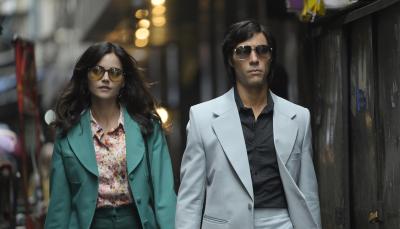Netflix's 'The Serpent' is a Captivating If Occasionally Confusing Slow Burn

WARNING: Embargoed for publication until 00:00:01 on 12/01/2021 - Programme Name: The Serpent - TX: n/a - Episode: n/a (No. 4) - Picture Shows: Monique/Marie-Andrée Leclerc (JENNA COLEMAN), Laxman (DARSHAN JARIWALLA), Charles Sobhraj (TAHAR RAHIM) - (C) Mammoth Screen Ltd - Photographer: Roland Neveu
WARNING: Use of this copyright image is subject to the terms of use of BBC Pictures' Digital Picture Service (BBC Pictures) as set out at www.bbcpictures.co.uk. In particular, this image may only be published by a registered User of BBC Pictures for editorial use for the purpose of publicising the relevant BBC programme, personnel or activity during the Publicity Period which ends three review weeks following the date of transmission and provided the BBC and the copyright holder in the caption are credited. For any other purpose whatsoever, including advertising and commercial, prior written approval from the copyright holder will be required.
Perhaps part of the instantaneous appeal of Netflix's The Serpent is that the story of serial killer Charles Sobhraj isn't terribly familiar to modern-day audiences. (Especially American ones.) A horrifying tale of a monster who preyed on well-meaning hippies traversing Southeast Asia searching for nirvana in the wake of the Vietnam War, it's a story whose outcome we aren't intimately familiar with and whose twists still arrive with the power to shock us as a result.
The real Sobhraj murdered at least a dozen people in the mid-1970s and was a man who, like American serial killer Charles Manson, found an exploitable loophole in the love all serve none ethos of the time period and the idealistic ease with which Western youths were able to lose themselves in the religion, drugs, and unfamiliar landscapes of countries like Thailand, Pakistan, and India. In short: You'll probably never feel as relieved to have a cell phone with GPS tracking enabled as you will after viewing this show.
A series that practically begs to be binged, The Serpent is aggressively non-linear in its storytelling, jumping between multiple time periods and locations in a way that is often difficult to follow, particularly in its earliest installments. We see the unfortunate fates of several of Sobhraj's initial victims - the death of a spiritual young American named Teresa, ostensibly headed to Nepal to join a monetary, is particularly upsetting - spliced between scenes that add varying degrees of context to his past. Elsewhere, the story follows a junior diplomat named Herman Knippenberg (Billy Howle), whose dogged investigation into the disappearance of two Dutch tourists, will eventually lead to Sobhraj's capture.

The cat and mouse-style chase that unfolds between the two men - complete with several frustrating near-misses and a moment in which Sobhraj literally just walks out of a Thailand jail - drives the bulk of the story, and thanks to The Serpent's intense love of jump cuts and skipping around in time is also its greatest weakness.
The story's most propulsive elements, including the ease with which Sobhraj slides between identities, from the names he uses to the attitude he projects at those around him, the unbearably tense sequences in which his victims realize that the supposedly kind man offering them shelter and fun drugs is actually poisoning them to death are often undercut by its consistently inconsistent narrative throughline. The onscreen placards that let us know it's "two weeks earlier" or "three months later" are helpful to a point, but they appear so often it feels as though the entire series needs a flow chart to follow.
To be fair, sometimes these out of time sequences work like gangbusters - I'm thinking particularly of a moment late in the series where we discover Sobhraj not only killed one lone hippie, but the girlfriend who desperately came searching for him, only to vanish herself, or the way The Serpent intercuts the glowing, hopeful arrival of Dutch travelers Wilhelm and Lena with their desperate, stricken pleas for help as they realize they've been poisoned.
There's so much power in the bones of this story, it really doesn't need the degree of narrative flourishes that The Serpent layers on top of it all.

While The Serpent certainly makes the most of its 1970s setting - from the period-accurate costumes to the truly lived-in, messy feel it bestows upon its versions of Bangkok and Nepal, what truly carries the show are the two actors at its scent. Tamar Rahim radiates creepiness as Sobhraj, smiling out of one side of his mouth at the trusting Westerners whose lives he's about to steal while simultaneously conveying his bone-deep distaste for almost everything about them. The Serpent doesn't spend a lot of time speculating as to the origins of Sobhraj's particular pathology, but in its quest not to excuse or glamorize his horrible acts (a good and necessary choice), but it is also strangely loath to look too hard at what exactly it is that makes him tick.
Jenna Coleman gleefully embraces her role as Marie-Andrée Leclerc, Sobhraj's moll-esque girlfriend with killer fashion sense and the dedicated ability to turn a blind eye to his heinous crimes. (it's very much not to her normal type of role, and I mean that in the best way possible.) As Marie sinks deeper into Sobhraj's world, she not only finds herself silently condoning his actions but eventually finding targets for him - whether out of a twisted kind of love or greed or a strange mix of both is left for the viewer to decide.
Yet, The Serpent gives us precious little insight into what she's truly thinking, though an early episode offers a backstory for her arrival in Asia and their subsequent courtship. Are we meant to feel sorry for Marie? To hope she somehow sees the truth and turns against Charles? Or to wonder if eventually, she'll give in to the darkness inside herself? The show doesn't ever really offer concrete answers to these questions, yet she's somehow still the character with the most thoroughly developed arc.

The situation is even worse when it comes to Charles' second-in-command Ajay Chowdhury, who gleefully commits murders and other various crimes for his friend/boss, openly hates Marie's influence in Charles' life, and is basically obsessed with him for reasons that are never entirely clear. Despite the series' love of flashbacks, there's somehow no real explanation for their friendship, and though Rahim is great at exuding a Manson-like deadly coolness, that's hardly enough to explain Ajay's willingness to drown others on his behalf.
In all honesty, this is the problem at the heart of The Serpent - though its propulsive binge format certainly helps cover it up - is that it can't seem to pick a lane when it comes to Sobhraj himself. Leary of making a mass murderer seem too rock-star cool, the series is loath to give him too much in the way of interiority. But because it doesn't, he's a leading character who's actually the least interesting part of the show that's ostensibly about him.
Probably a whole lot of viewers won't be bothered by this fact and to be honest, I wasn't either for the most part. The rest of the story is compulsive enough that it almost makes up for the black hole at its center, who somehow still keeps the rest of it in motion.
Are you planning to give The Serpent a look? Let's discuss in the comments.




